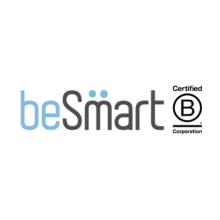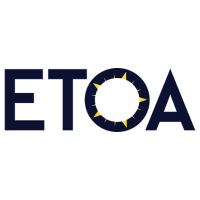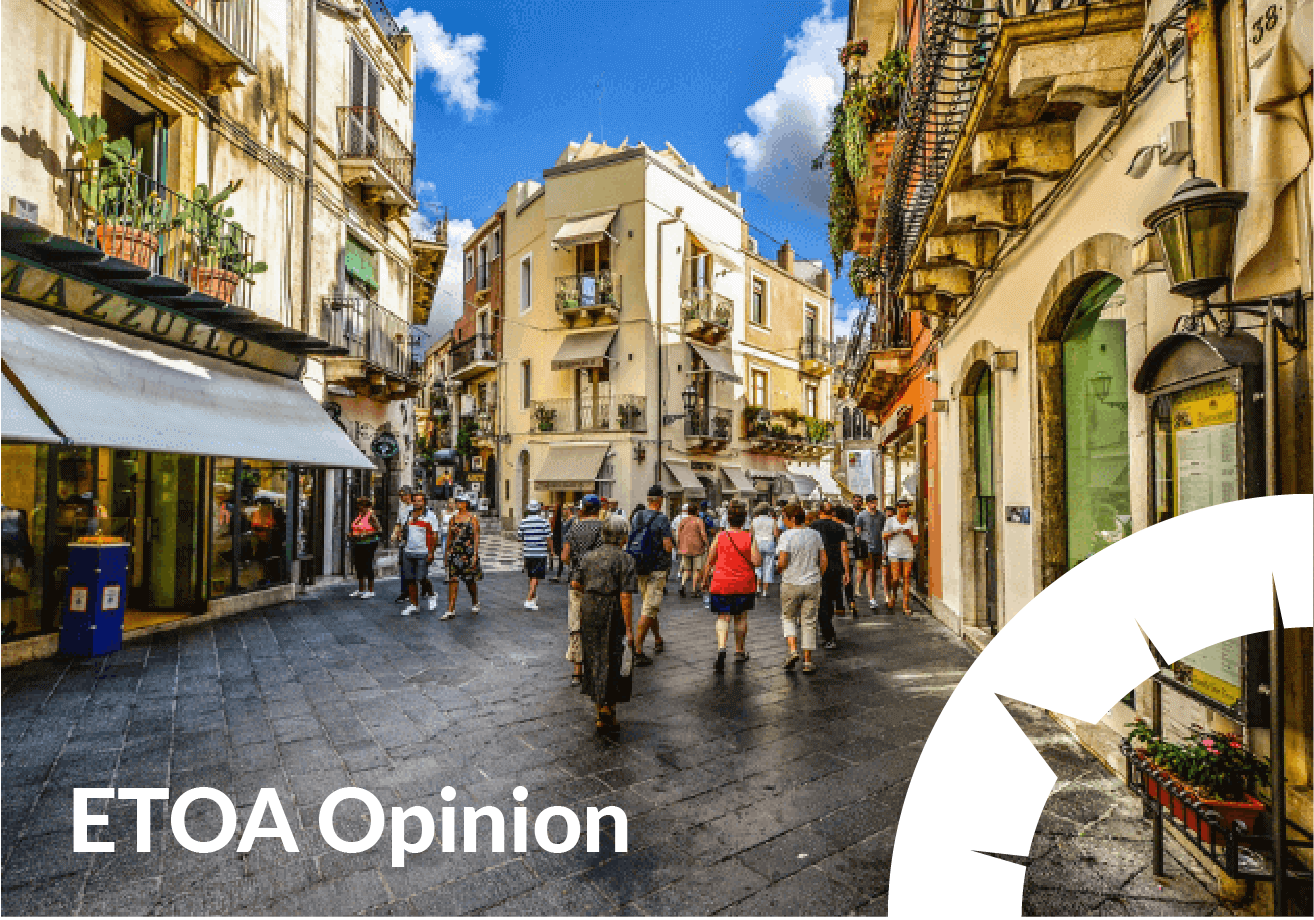News:
27 November 2024 | ETOA joined a panel at BTO – Bridging the Gap exploring how data, AI and behavioural science can deliver more sustainable tourism from the perspective of visitors, the travel trade, destinations and host communities.
11-12 November 2024 | ETOA attended the European Tourism Forum in Budapest, which focused on the sector’s green and digital transition in the context of a new European Commission for which tourism’s political recognition has grown through the appointment of a Commissioner for Sustainable Transport and Tourism.
7-8 November 2024 | ETOA attended a symposium in Vienna on Sustainable Tourism Mobility, organised by the Austrian government, contributing travel-trade insight on coach tourism, ticketing and connectivity.
ETOA and Sustainability
For tourism to remain a valued part of the European economy and generate useful employment it must be sustainable: economically, socially, and environmentally. Related considerations drive consumer choice, investment criteria and political calculation, influencing all aspects of travel and tourism.
Our Priorities
- ETOA’s current priorities in support of sustainable practice are:
-
- Climate action
- Product diversification
Our Purpose
- Advocate for a better understanding and improved perception of tourism in Europe.
- Promote better destination management and product development.
- To support the development of a wide consensus in support of good practice.
What ETOA is doing
- Working with destinations, industry partners and academic experts.
- Supporting market development of destination and product.
- Running events, contributing to debate and publishing materials.
Our Sustainability Progress
Like our climate action work, ETOA’s sustainability progress is multidimensional. In-house, this includes recording our team travel, as described in our Climate Action Plan. We also support our members in becoming more sustainable and advocate for the sustainable transition of tourism.
More information about ETOA’s climate action progress can be found on our Climate page.
As one of ETOA’s top sustainability priorities, most of our in-house sustainability progress can be found on our Climate Action page.
Product diversification is driven by our events attracting buyers, suppliers and destinations interested in long-haul and intra-European markets. Topical insight to support the business case and practical implementation of transition is offered at conferences, in webinars and online.
In December 2020, ETOA formally declared a climate emergency and subsequently published a climate action plan. We are members of the Working Group on Capacity Building to support implementation of the Glasgow Declaration in collaboration with UN Tourism’s One Planet initiative.
Sharing places with others who find them appealing is our common experience: how tourism can help to do it better requires creativity, determination and above all, smart public-private collaboration.
Including over 100 national, regional and local destination management organisations, ETOA is well placed to be an effective partner in driving product diversification, visitor dispersal, and supporting strategic change.
We contribute to a range of panels and other third party events. Our sustainability partners include European Travel Commission (ETC), NECSTouR and CELTH. We also participate in the UN Tourism working group of experts on Measuring the Sustainability of Tourism (MST).
27 November 2024 | ETOA joined a panel at BTO – Bridging the Gap exploring how data, AI and behavioural science can deliver more sustainable tourism from the perspective of visitors, the travel trade, destinations and host communities.
11-12 November 2024 | ETOA attended the European Tourism Forum in Budapest, which focused on the sector’s green and digital transition in the context of a new European Commission for which tourism’s political recognition has grown through the appointment of a Commissioner for Sustainable Transport and Tourism.
7-8 November 2024 | ETOA attended a symposium in Vienna on Sustainable Tourism Mobility, organised by the Austrian government, contributing travel-trade insight on coach tourism, ticketing and connectivity.
6 November 2024 | ETOA spoke at an Open Day in Brussels for FU-TOURISM, an EU-funded accelerator programme designed to support SMEs in Belgium, Austria, Croatia, Poland and Spain in their transition to more sustainable practice.”
10 October 2024 | ETOA presented in two panels at TTG Rimini – one on Euro-Emotur, and EU-funded project in which we are a partner, driving diversification through helping small business market more effectively online, and the other arranged by our partner FTO, ‘Sostenibilità Autentica: Incoming in Italia tra Verità e Innovazione’, also addressing product diversification and related policy implications.
02 October 2024 | ETOA delivered a lecture on strategic context of crisis management, developing support for change within destinations and the value chain, and maximising mutual interest.
ETOA Industry Partners - Sustainability
While competition supports quality and choice, a collaborative sustainability effort is essential for tourism to maintain a safe space within which to operate. Smart partnership with organisations committed to sustainability allows ETOA to deliver better support to its members, accessing expertise and good practice resources including products and services that facilitate their sustainable transition.
ETOA’s Industry Partners committed to climate action are featured on our Climate page.
BehaviorSMART
BehaviorSMART™ has joined forces with ETOA to enable experience design innovations that balance traveller happiness with impact for the place and its residents.
BehaviorSMART™ is a B Corp certified company that applies insights from behavioural sciences to optimize market success and sustainability performance in tourism. BehaviorSMART’s solutions help destinations and enterprises progress towards the Sustainable Development Goals (SDG) and Net Zero operations while enhancing traveller satisfaction. The company designs and delivers training and advisory services that lead to behaviour change needed to permanently transition towards a balance between profitability and sustainability.
Keep up-to-date with where BehaviorSMART participates and speaks. Members can watch BehaviorSMART’s latest webinar on the Insights Hub.
BehaviorSMART recently launched the beSMART Platform – a proprietary solution powered by insights from behavioural science. beSMART enables travel businesses and destinations to adjust service design across their supply chain ecosystems in order to seamlessly steer travellers towards better options. The platform makes responsible choices easy, practical, and profitable for travel businesses, enabling them to close the intention-action gap, i.e. travellers’ growing desire to enjoy more responsible holidays and their inability to act on that.
Watch the demo, Welcome to the beSMART Platform! to see beSMART in action.
Fast and Effective
Each “Topic” on the beSMART Platform (e.g., Promote Local Food) takes only 3–5 hours to complete, enabling businesses to activate change and observe effects quickly. The platform empowers individual businesses — accommodations, food services, activity providers — as well as destination teams in marketing, sales, communications, and operations. It’s also highly effective for entire destinations (and their supply network), outbound operators and their suppliers, DMCs and their suppliers, and networks such as associations or chains.
The Unique Value of beSMART
The platform is powered by science-based knowledge about traveller psychology packaged as micro-actions that travel destinations and businesses can quickly apply to their communications, operations, product design, and measurement. These influence behaviours such as buying locally, reducing carbon footprints, or leaving no trace in nature.
To illustrate the effects of the actions that you can find on beSMART:
- 38% reduction in general waste at a camping complex in Norway resulting from a smart adjustment of visual signs at waste collection points
- 100% of the guests at an accommodation complex in Bohinj Region (Slovenia) opt for less visited spots featured with engaging descriptions on a list with suggested places to visit
- 20% reduction of the waste generated by an Italian operator of sailing adventures resulting from simple food shopping tips
For more information, visit the beSMART Platform Page or contact the team at hello@behavior-smart.com
Partner with us!
If you have expertise that will help our members transition to more sustainable practice, please get in touch with us.
Contact: sustainability@etoa.org
Sustainability and the Business Environment
Sectoral Policy
The European Commission’s Transition Pathway for Tourism, published in February 2022, identifies 27 topics for action (see Appendix 1). The implementation of all should consider three priorities according to the Commission: “the green transition (environmental sustainability and climate neutrality); the digital transition; the move to a greater resilience.”
Building sectoral resilience requires strategic investment and support for sustainable practice.
There will be public and private sector responses. International aviation emissions are included in EU climate goals. Product and demand will evolve. Clients increasingly require carbon-footprint information. Some may travel less but stay longer. For aviation-dependent destinations, especially islands, how to mitigate impact once on land becomes an ever more pressing concern. With remote working now widely accepted, relocating for a longer period may become more practical and appealing. Group tourism is showing a shift to smaller, more in-depth itineraries.
ETOA as co-chair of the Tourism Manifesto was pleased to support the inclusion of decarbonisation as the first of its four policy priorities in its 2024 – 2029 EU Mandate, Tourism in Transition: A New Consensus for Change.
Non-Sectoral Policy
In March 2023 the European Commission published proposals for a Green Claims Directive. For the official EC presentation on the proposal and related circular economy initiatives, click here.
More from Sustainability at ETOA
ETOA members can find sustainability webinars, industry insights, opinions and research in our Insights Hub.
Post-Pandemic
The European Commission identified tourism as the sector most adversely affected by the COVID-19 pandemic, launching the Tourism Transition Pathway in February 2022. Building sectoral resilience requires strategic investment and support for sustainable practice.
Europe remains a popular destination among a growing worldwide population who can afford to travel. Demand from long-haul markets is driving aviation-dependent visitor flows. Nevertheless, the ‘build back better’ rhetoric met the reality of tough business conditions for both buyers and the supply chain. For many, strategic planning for climate action is less urgent than finding solutions to immediate problems.






